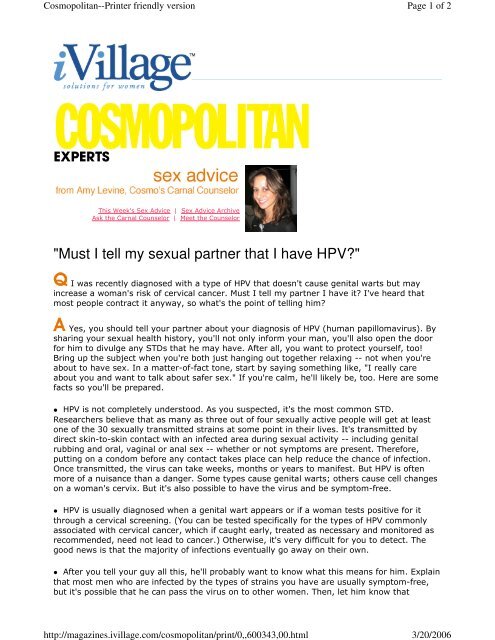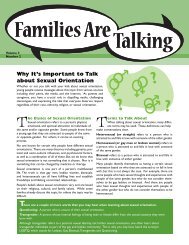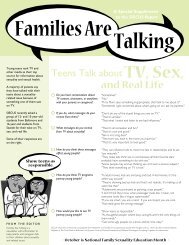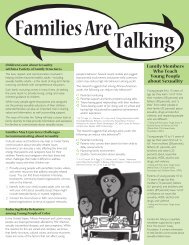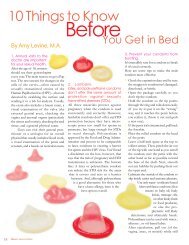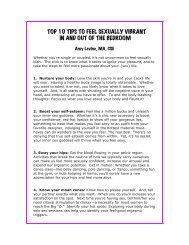"Must I tell my sexual partner that I have HPV?" - Sex Ed Solutions
"Must I tell my sexual partner that I have HPV?" - Sex Ed Solutions
"Must I tell my sexual partner that I have HPV?" - Sex Ed Solutions
You also want an ePaper? Increase the reach of your titles
YUMPU automatically turns print PDFs into web optimized ePapers that Google loves.
Cosmopolitan--Printer friendly version<br />
http://magazines.ivillage.com/cosmopolitan/print/0,,600343,00.html<br />
Page 1 of 2<br />
3/20/2006<br />
This Week's <strong>Sex</strong> Advice | <strong>Sex</strong> Advice Archive<br />
Ask the Carnal Counselor | Meet the Counselor<br />
"<strong>Must</strong> I <strong>tell</strong> <strong>my</strong> <strong>sexual</strong> <strong>partner</strong> <strong>that</strong> I <strong>have</strong> <strong>HPV</strong>"<br />
I was recently diagnosed with a type of <strong>HPV</strong> <strong>that</strong> doesn't cause genital warts but may<br />
increase a woman's risk of cervical cancer. <strong>Must</strong> I <strong>tell</strong> <strong>my</strong> <strong>partner</strong> I <strong>have</strong> it I've heard <strong>that</strong><br />
most people contract it anyway, so what's the point of <strong>tell</strong>ing him<br />
Yes, you should <strong>tell</strong> your <strong>partner</strong> about your diagnosis of <strong>HPV</strong> (human papillomavirus). By<br />
sharing your <strong>sexual</strong> health history, you'll not only inform your man, you'll also open the door<br />
for him to divulge any STDs <strong>that</strong> he may <strong>have</strong>. After all, you want to protect yourself, too!<br />
Bring up the subject when you're both just hanging out together relaxing -- not when you're<br />
about to <strong>have</strong> sex. In a matter-of-fact tone, start by saying something like, "I really care<br />
about you and want to talk about safer sex." If you're calm, he'll likely be, too. Here are some<br />
facts so you'll be prepared.<br />
<strong>HPV</strong> is not completely understood. As you suspected, it's the most common STD.<br />
Researchers believe <strong>that</strong> as many as three out of four <strong>sexual</strong>ly active people will get at least<br />
one of the 30 <strong>sexual</strong>ly transmitted strains at some point in their lives. It's transmitted by<br />
direct skin-to-skin contact with an infected area during <strong>sexual</strong> activity -- including genital<br />
rubbing and oral, vaginal or anal sex -- whether or not symptoms are present. Therefore,<br />
putting on a condom before any contact takes place can help reduce the chance of infection.<br />
Once transmitted, the virus can take weeks, months or years to manifest. But <strong>HPV</strong> is often<br />
more of a nuisance than a danger. Some types cause genital warts; others cause cell changes<br />
on a woman's cervix. But it's also possible to <strong>have</strong> the virus and be symptom-free.<br />
<strong>HPV</strong> is usually diagnosed when a genital wart appears or if a woman tests positive for it<br />
through a cervical screening. (You can be tested specifically for the types of <strong>HPV</strong> commonly<br />
associated with cervical cancer, which if caught early, treated as necessary and monitored as<br />
recommended, need not lead to cancer.) Otherwise, it's very difficult for you to detect. The<br />
good news is <strong>that</strong> the majority of infections eventually go away on their own.<br />
After you <strong>tell</strong> your guy all this, he'll probably want to know what this means for him. Explain<br />
<strong>that</strong> most men who are infected by the types of strains you <strong>have</strong> are usually symptom-free,<br />
but it's possible <strong>that</strong> he can pass the virus on to other women. Then, let him know <strong>that</strong>
Cosmopolitan--Printer friendly version<br />
http://magazines.ivillage.com/cosmopolitan/print/0,,600343,00.html<br />
Page 2 of 2<br />
3/20/2006<br />
condoms will likely decrease the chances of transmission.<br />
If either of you wants more information about <strong>HPV</strong>, call the National STD Hotline at (800) 342-<br />
2437 (open 24 hours, seven days a week) or the national <strong>HPV</strong> hotline at (877) <strong>HPV</strong>-5868<br />
(open 2pm to 7pm EST, Monday-Friday).<br />
Check out The Test That Can Save Your Life for more on <strong>HPV</strong>, the importance of pap-smears,<br />
and getting the most out of your gyno visits.<br />
© iVillage Inc. 1995-2005. All rights reserved. terms of service


